Education of the Heart
22/10/2014 22:43 (GMT+7) Font size:  
Vancouver, BC, Canada, 21 October 2104 - After a long journey to Vancouver from India via Japan, on his fourth visit to the city, His Holiness the Dalai Lama’s first public engagement today was at John Oliver School. He witnessed two classroom demonstrations. 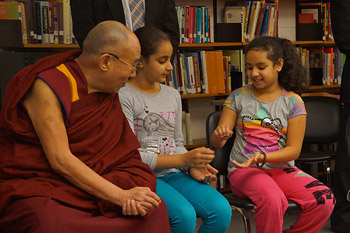
| | Students talking about gratitude with His Holiness the Dalai Lama during his visit to John Oliver School in Vancouver, Canada on October 21, 2014. Photo/Jeremy Russell/OHHDL |
The first involved junior students who were focused on gratitude. Seated in a circle, each of them expressed something they were grateful for. When asked how gratitude helps in our lives His Holiness said:
“Gratitude is something you show in relation to others.”
He agreed with the teacher that happiness spreads joy and helps us feel calm towards others.
The second class of senior students were observing one of their number who was being monitored for attention and brain function. Each time she tried to refocus her attention, one student explained, she was activating neurons in her brain. Asked how to remain focused and happy every day, His Holiness replied:
“When a plane takes off, thousands of parts and processes are involved. Similarly in the mind we have emotions, many of them disturbing, but some of them useful. To maintain a calm mind we need to understand how the mind and emotions work; we need a map of the mind. That knowledge we can apply to the mind. Once we see how irritation and anger disturb our peace of mind we can apply means to counter them. Disturbing emotions are harmful to our peace of mind; they give us stress and raised blood pressure. They upset our sleep and disturb our dreams. In the long run, fear and anger are bad for our health. What’s more, if the mind is full of negative emotions we won’t be able to make friends. To do that we need trust, and trust is related to affection.”
In the school gym, 1400 students, teachers and parents had gathered to listen to His Holiness discuss Educating the Heart with a panel of students. He pointed out that living a happy life does not depend on being wealthy or coming from a good family. Money and power, he said, often bring with them anxiety and stress.
“Here in the 21st century, the problems and violence we see around us are not only man-made, but made by educated people. This shows that our existing education systems lack moral principles. How can we introduce moral principles? We can’t expect the government to do it, nor the UN. Religion may be of some help, but will not reach all 7 billion human beings alive today. The only way is through education. However, at present most education is focused on material things, not on the importance of inner values. This is what we need to change.”
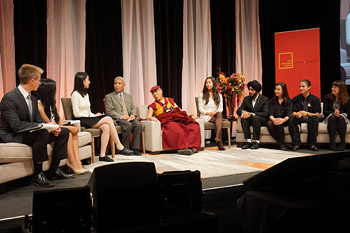 | His Holiness the Dalai Lama along with a panel of students discussing the topic "Educating the Heart" at John Oliver School in Vancouver, Canada on October 21, 2014.
Photo/Jeremy Russell/OHHDL |
Most important in this project is not necessarily a focus on our different cultures and languages, but on the idea of the oneness of humanity, the sense that we all belong to one human family. His Holiness explained that he has been talking to scientists, medical and brain specialists for more than 30 years and they are now presenting evidence that warm-heartedness reduces stress, blood pressure and brings inner peace. At the same time they suggest that constant fear, anger and suspicion eat away at our immune systems.
Asked about the role of patience, His Holiness noted that by applying our wonderful human intelligence we can come to understand how dependent we are on others. In that context, patience and forgiveness have the function of protecting our own interests. When another student asked about the importance of the role of our mothers, His Holiness drew on his own experience to highlight the importance of affection in healthy development. Dr Kim Schonert-Reichl mentioned evidence that suggests that offering others voluntary help reduces cardio-vascular risk. So educating the heart supports the health of the physical heart. His Holiness agreed, saying:
“Compassion suits our physical condition, whereas anger, fear and distrust are harmful to our well-being. Therefore, just as we learn the importance of physical hygiene to physical health, to ensure healthy minds, we need to learn some kind of emotional hygiene.”
As the discussion came to an end, His Holiness remarked that while his job is just to come and talk, he has been impressed to learn how much of what he talks about schools in British Columbia are trying to put into effect.
Attending a luncheon with 300 community leaders, as well as trustees and sponsors of the Dalai Lama Center, sponsored by Lift the Children Foundation, His Holiness was invited to present three humanitarian awards. The event was introduced by Mayor of Surrey, Dianne Watts. Fiona Douglas-Crampton, CEO of the Dalai Lama Center for Peace and Education explained some of its activities and showed an artful illustrative video. Victor Chan, who co-founded the Dalai Lama Center with His Holiness, told how he first met him by chance more than 40 years ago. In a short address, His Holiness said:
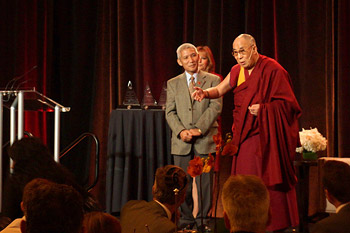
| His Holiness the Dalai Lama speaking at a luncheon sponsored by the Lift the Children Foundation in Vancouver, Canada on October 21, 2014. Photo/Jeremy Russell/OHHDL
|
“Dear brothers and sisters, today I’m going to present awards to three good human beings. This is at a time when our education system is largely dedicated to material ends and there is little concern for human affection. Corruption and disdain for others flourish because of a lack of moral principles and yet I believe it is possible to live honestly and transparently with nothing to hide. A sense of concern for others’ well-being is the best source of inner peace and, for example, if you believe in God, is the best way to serve him.”
Taking questions from the floor, His Holiness explained that the way to develop inner peace through meditation begins with the recognition that the destroyer of inner peace is not some external foe, but is within us. Therefore, the solution is within us too. However, he warned that inner change does not take place immediately in the way that we switch on a light, but takes weeks, months and years. Asked the most important thing to teach children, he answered:
“Show them affection.”
When someone else wanted to know how to bring calm to a violent world, His Holiness conceded that it is very difficult and that while he does not expect to see a really peaceful world in his lifetime he hopes that peace will come in the future.
His Holiness presented awards to three men who in their vision and leadership have exemplified a humanitarian spirit that has changed lives. They were Frank Giustra, John Volken and Djavad Mowafaghian. Each expressed their acceptance modestly with Mr Mowafaghian voicing a wish to see His Holiness living freely again in Tibet.
In the afternoon, before an audience of almost 3000, His Holiness joined a forum discussion of the Science of Education of the Heart. As he entered the hall of the Vancouver Convention Centre, children of the Saint James Musical Academy were singing Songs of Joy. Fiona Douglas-Crampton introduced the event whose theme was Be the Village. She mentioned five guidelines that are part of the Be the Village Challenge - getting along with others; being compassionate and kind; solving problems peacefully; feeling secure and calm; and being alert and engaged. Geoff Plant introduced His Holiness asking him to speak about how educating the heart leads to happiness. His Holiness began:
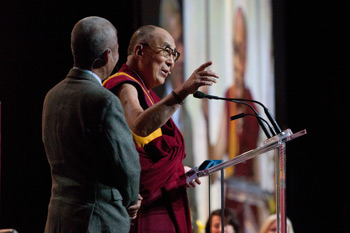
| His Holiness the Dalai Lama speaking at the forum on Science of Education of the Heart at the Vancouver Convention Center in Vancouver, Canada on October 21, 2014.
Photo/Dalai Lama Center
|
“Dear brothers and sisters, don’t think of me as anything special, nor as a stranger. If we think back to when we were young, we didn’t care about someone else’s background or social position. All that mattered was their sense of affection. As we grow up this simpler view falls away or seems to become less relevant. We place more emphasis on the secondary differences between us.
“None of us wants trouble or problems and yet we are beset by problems largely of our own making. We use our intelligence and resources to create immensely destructive weapons, which only create suffering. The idea that we can resolve problems by force is out of date. All it means is that the innocent, women and children, suffer most.
“We have to recognise that we live in a world that is interdependent. What affects others affects us too. Climate change, for example, has no respect for national boundaries. And yet we don’t feel concern for the other 7 billion human beings, we don’t think of them as part of one human family. How can we overcome this negligence? By law, through the media, or through religion? Affection, a sense of community and a sense of concern for others are not some kind of luxury. They’re about the survival of humanity. The ultimate source of happiness is within us; the calm mind that makes us relaxed, improves our health and makes for happier families and communities.”
Shane Pointe, a Musqueam Elder, invited everyone to join hands while he chanted. Shane Koyczan, a Spoken Word Artist recited a poem that David Suzuki the Canadian environmental acitivist had asked him to write about why the earth is so precious. Dr Kim Schonert-Reichl explained how His Holiness and the Dalai Lama Center’s work have influenced education in British Columbia where there has been a marked increase in Social and Emotional Learning (SEL) and self-regulation in education. Janet Austin of the YWCA spoke of efforts to promote equality. Tamara Vrooman, CEO of Vancity spoke of the role of the business community in developing compassion, asking why people tend to apply different values to their life at home and at work. His Holiness commented that this results when society is focused too much on material rather than on inner development. He remarked that developing a concern for others’ well-being is the best way to fulfil your own interests.
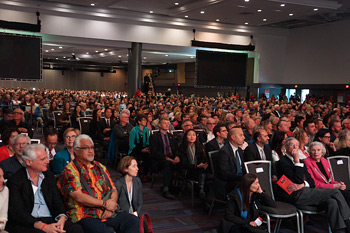
| Some of the over 3000 people attending the forum on Science of Education of the Heart with His Holiness the Dalai Lama at the Vancouver Convention Center in Vancouver, Canada on October 21, 2014. Photo/Jeremy Russell/OHHDL
|
Peter Senge who writes and teaches about leadership asked why we do not think of using electricity generated by burning coal to charge our mobile phones as an ethical issue. He asked how we can develop a broader sense of compassion. His Holiness answered that we need to develop respect for the oneness of human beings, the sense that we all belong to one human family. And, he said, it’s urgent because too often we only become aware of the damage we are doing to the environment once it is too late to stop it. We need education and we need happiness, just as we need clean air.
The forum concluded with words of thanks, the thought that British Columbia may be the first place to implement His Holiness’s advice for a heart-mind balance in its education, and the joyful singing of the children of the Saint James Musical Academy.  http://www.dalailama.com/
|